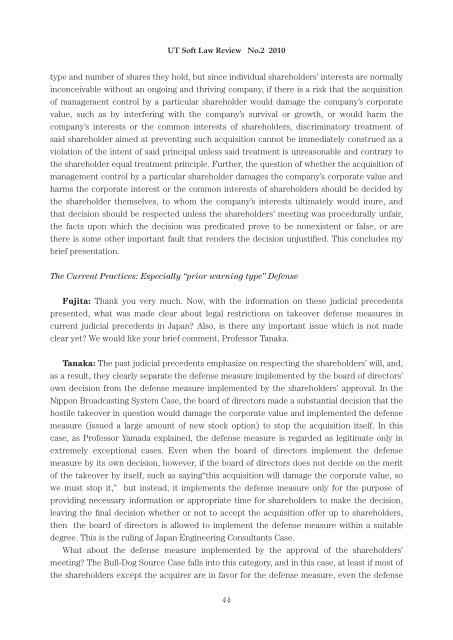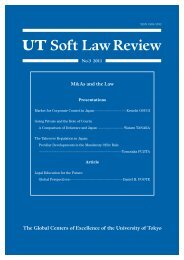<strong>UT</strong> <strong>Soft</strong> <strong>Law</strong> <strong>Review</strong> No.2 2010and Quants Case; Unless there is a special situation to justify, issuance of new shares to athird party is believed to be made mainly to decrease the shareholding of existingshareholders so that current management could maintain control over the business. Thecurrent management claimed the collected capital was to be used for redemption of corporatebonds, but, while funding is deemed to be generally needed, it is not enough to be consideredas a special situation to justify this issuance of new shares. Therefore, after 40 million JPY wasdeposited as security, this issuance of new shares was withheld by the court.The next case is very famous Nippon Broadcasting System Case’s restraining order againstissuance of new stock option. I will not go into the details because everybody knows aboutthis case very well. In the high court decision regarding this Nippon Broadcasting SystemCase, four types, or four categories, are frequently quoted: (1) greenmail, (2) “scorchedearth” management, (3) aiming to use the target company's assets as the company’s collateraletc., and (4) aiming to sell off assets to produce a large one-time dividend. Basically, I believethe former part is as important as the rest above mentioned four categories. The reason whythe issuance of new stock option with the purpose of maintaining/securing the control overthe business is that the directors are based on the trust of the owner of the company, orshareholders. If there is a special situation to justify the issuance of new stock option toprotect the overall interest of the shareholders, the allotment of stock options to a third partyfor the main purpose of maintaining/securing corporate control should be exceptionallyregarded as legitimate. The above mentioned four categories, such as greenmail, are shown asexamples of the special situations. However, as everybody knows, finally in this case, theissuance was suspended because there was no prima-facie evidence or proof.Next, let’s look at Japan Engineering Consultants Case. As for this ruling, the latter part isespecially important. “When the takeover battle of a corporation exists, the shareholdersshould choose between current management and hostile acquirer to entrust the management,and the board of directors is entitled to adopt a suitable measure for the purpose of providingsuitable information and time for shareholders to deliberate upon the proposal.” and “Theboard of directors is entitled to request the hostile acquirer to provide a business plan andenough time to consider it in order to provide the shareholders with appropriate informationand time to deliberate it, but also to file a suit against the acquirer who does not respond toreasonable requests for not being provided the enough information and time to consider theproposal, within the concept of the Securities and Exchange Act and application of “thedoctrine of balance of power distribution” by the Commercial Code.”Now, it seems that our time is limited, let’s move to Bull-Dog Source Case, which has beenrepeatedly quoted. I am sure that everybody is familiar with this case, so let’s jump to thecourt ruling. Unlike other cases where defense measure was implemented by the board ofdirectors, in this case, it was implemented by the approval of shareholders’ meeting. Thesupreme court supported the original ruling (Tokyo High Court judgment of July 9, 2007,Finance and commerce judicial precedent No.1271 p.17:) for the following reason: Accordingto the principle of shareholder equal treatment,to protect the interests of individualshareholders, the company is obligated to treat shareholders fairly and equally based on the43
<strong>UT</strong> <strong>Soft</strong> <strong>Law</strong> <strong>Review</strong> No.2 2010type and number of shares they hold, but since individual shareholders’ interests are normallyinconceivable without an ongoing and thriving company, if there is a risk that the acquisitionof management control by a particular shareholder would damage the company’s corporatevalue, such as by interfering with the company’s survival or growth, or would harm thecompany’s interests or the common interests of shareholders, discriminatory treatment ofsaid shareholder aimed at preventing such acquisition cannot be immediately construed as aviolation of the intent of said principal unless said treatment is unreasonable and contrary tothe shareholder equal treatment principle. Further, the question of whether the acquisition ofmanagement control by a particular shareholder damages the company’s corporate value andharms the corporate interest or the common interests of shareholders should be decided bythe shareholder themselves, to whom the company’s interests ultimately would inure, andthat decision should be respected unless the shareholders’ meeting was procedurally unfair,the facts upon which the decision was predicated prove to be nonexistent or false, or arethere is some other important fault that renders the decision unjustified. This concludes mybrief presentation.The Current Practices: Especially “prior warning type” DefenseFujita: Thank you very much. Now, with the information on these judicial precedentspresented, what was made clear about legal restrictions on takeover defense measures incurrent judicial precedents in Japan? Also, is there any important issue which is not madeclear yet? We would like your brief comment, Professor Tanaka.Tanaka: The past judicial precedents emphasize on respecting the shareholders’ will, and,as a result, they clearly separate the defense measure implemented by the board of directors’own decision from the defense measure implemented by the shareholders’ approval. In theNippon Broadcasting System Case, the board of directors made a substantial decision that thehostile takeover in question would damage the corporate value and implemented the defensemeasure (issued a large amount of new stock option) to stop the acquisition itself. In thiscase, as Professor Yamada explained, the defense measure is regarded as legitimate only inextremely exceptional cases. Even when the board of directors implement the defensemeasure by its own decision, however, if the board of directors does not decide on the meritof the takeover by itself, such as saying“this acquisition will damage the corporate value, sowe must stop it,” but instead, it implements the defense measure only for the purpose ofproviding necessary information or appropriate time for shareholders to make the decision,leaving the final decision whether or not to accept the acquisition offer up to shareholders,then the board of directors is allowed to implement the defense measure within a suitabledegree. This is the ruling of Japan Engineering Consultants Case.What about the defense measure implemented by the approval of the shareholders’meeting? The Bull-Dog Source Case falls into this category, and in this case, at least if most ofthe shareholders except the acquirer are in favor for the defense measure, even the defense44





